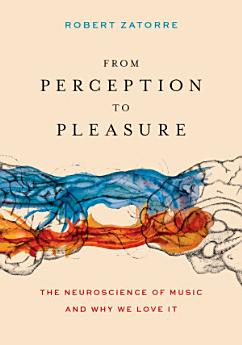From Perception to Pleasure: The Neuroscience of Music and Why We Love It
Nov 2023 · Oxford University Press
Ebook
350
Pages
family_home
Eligible
info
reportRatings and reviews aren’t verified Learn More
About this ebook
Why do we love music? What enables us to create it, perceive it, and enjoy it? In From Perception to Pleasure, Robert Zatorre provides answers to these questions from the perspective of cognitive neuroscience, explaining how we get from perception of sound patterns to pleasurable responses. The book is organized around a central thesis: that pleasure in music arises from interactions between cortical loops that enable processing of sound patterns, and subcortical circuits responsible for reward and valuation. This model integrates knowledge derived from basic neuroscience of the auditory system and of reward mechanisms with the concept that perception and pleasure depend on mechanisms of prediction, anticipation, and valuation. The first part of the book describes the pathways to and from the auditory cortex that generate internal representations of musical structure at different levels of abstraction, which then interact with memory, sensory-motor, and other cognitive mechanisms that are essential to perceive and produce music. The second part of the book focuses on the functional anatomy of the dopaminergic reward system; its involvement in musical pleasure; the links between prediction, surprise, and complexity; and what happens when the system is disrupted. The book is richly illustrated to help the reader follow the scientific findings. Most of all, From Perception to Pleasure provides an integrative model for a large body of scientific knowledge that explains how patterns of abstract sounds can generate profoundly moving hedonic experiences.
About the author
Robert Zatorre was born and raised in Buenos Aires, Argentina. He studied music and psychology at Boston University, and obtained his PhD at Brown University, followed by postdoctoral work at the Montreal Neurological Institute of McGill University, where he currently holds a Canada Research Chair. His laboratory studies the neural substrates of auditory cognition, focusing on two characteristically human abilities: speech and music. Together with his many students and collaborators he has published more than 300 scientific papers on topics including pitch perception, musical imagery, music production, brain plasticity, hemispheric specialization, and the role of the reward system in musical pleasure. In 2006 he co-founded the International Laboratory for Brain, Music and Sound Research (BRAMS). His work has been recognized by numerous international prizes, including the C.L. de Carvalho-Heineken Prize for Cognitive Science (Amsterdam) and the Grand Prix Scientifique from the Institute for Hearing in Paris. He tries to keep up his baroque repertoire on the organ whenever he gets a chance.
Rate this ebook
Tell us what you think.
Reading information
Smartphones and tablets
Install the Google Play Books app for Android and iPad/iPhone. It syncs automatically with your account and allows you to read online or offline wherever you are.
Laptops and computers
You can listen to audiobooks purchased on Google Play using your computer's web browser.
eReaders and other devices
To read on e-ink devices like Kobo eReaders, you'll need to download a file and transfer it to your device. Follow the detailed Help Center instructions to transfer the files to supported eReaders.




